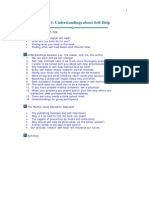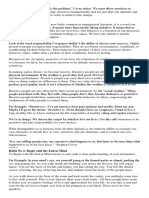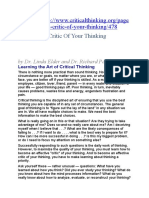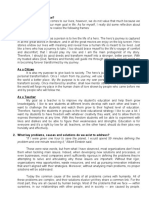Influencer: Quotes, Questions and Comments
Influencer: Quotes, Questions and Comments
Uploaded by
SarvashreshthaPatelCopyright:
Available Formats
Influencer: Quotes, Questions and Comments
Influencer: Quotes, Questions and Comments
Uploaded by
SarvashreshthaPatelOriginal Title
Copyright
Available Formats
Share this document
Did you find this document useful?
Is this content inappropriate?
Copyright:
Available Formats
Influencer: Quotes, Questions and Comments
Influencer: Quotes, Questions and Comments
Uploaded by
SarvashreshthaPatelCopyright:
Available Formats
I
have never been so influenced by any book more than Stephen Coveys The 7 Habits of Highly Effective People. One of the most significant concepts that Covey introduces is that there is something called a Circle of Concern things which influence us, within which there is a Circle of Influence things over which we have an influence over. What we must as humans who want to be effective must do, is act within our Circle of Influence, meaning that we must exercise our four unique human endowments self awareness, conscience, imagination and independent will, and change things we can, an that we must smile at situations we cant. In other words, accept serenity. Also, Covey does enlighten us about what we must do; however, how we must do, is left to our own imagination. I was inspired to read this book because it begins where Covey ends! This book is radical in the fact that it tells the reader that accepting serenity is kind of a sin, and that we can indeed change things which apparently, seem to lie out there in our Circle of Concern. It takes a clinical approach to diagnosing the problems we have, and find solutions to them without the burden of having to invent them, that the solutions are already there, we just need to go and grab them. So I read on.
Influencer
The Power to Change Anything
Quotes, Questions and Comments
by Sarvashreshtha Patel
Quotes and Comments
People tend to be better copers than influencers. In fact, were wonderful at inventing ways to cope.
When I observe my 3 year daughter closely, I feel that one of the most basic of human traits is to constantly investigate, experiment, act, reflect and re-act. This is the foundation of human learning and civilization. This is how a child becomes an adult. In the process, however, we become exposed to our own limitations and confuse them with the bounds of possibility. When we grow up, we nurture our young ones into this mentality giving them the parent part of their personality. I believe that most people dont go the further mile to change things because of the influence of people who have tried to change things but have failed. What they then learn is not how to change their realities but how to accept them and cope up with them. In essence, what people do is learn how to cope up situations that may have been limiting for other people than their own selves.
Confusing outcomes with behaviours is no small issue. In fact, when you look at most failed influence strategies, youre likely to find at least one example of means/ends confusion. A few months back, I was endowed with a task of counseling a group of students who were identified as problem-creators in classroom proceedings. After having talked to them at length, I discovered that they did not pay attention in class, which is why they were not able to solve their assignments, which led to their teachers reprimanding them, resulting in a general unrest and indifference towards academics, which eventually resulted in distraction and disruptive behaviour. What they also admitted was that they wanted to learn, be like their goody-goody classmates, but somehow were not able to. I had just one prescription for them. Always be ready with a pen and notebook, and take notes of what the teacher is teaching. Now the students knew exactly what they needed to do in order to pay attention in class, and the problems associated with them just vanished. It did require me to constantly follow through for some time, but the outcome was miraculous. What I told them is what they needed to do in order to ensure that they paid attention, rather than loads of advice and the commonplace instruction Pay attention in class. This works!
Positive Deviance can be extremely helpful in discovering the handful of vital behaviours that will help solve the problem youre attacking.discover and study settings where the targeted problem should exist but doesnt. Third, identify the unique behaviours of the group that succeeds.
I once read somewhere that during his initial life, Dale Carnegie was so depressed that he attempted suicide. But just as he was about to do so, one thought struck him. What is that successful people do? He aborted the idea of suicide and set upon a journey to discover the answer. The result was one of the most powerful influence books in history How to win friends and influence people. When we narrow our focus to the few people who are exceptions to a general rule, and identify what they do in order to succeed, we can be profoundly influenced. What is even more significant is that we can become influencers ourselves by modeling the behavior of those few successful people.
When it comes to altering behavior, you need to help others answer only two questions. First: Is it worth it? (If not, why waste the effort?)And second: Can they do this thing? (If not, why try it?)
When I recall the instance where I was able to influence those students who were potential problemcreators, I feel that the students took my advice because I was able to show them the benefits of notetaking. Note-taking helps you sustain attention in class, and those notes can be referred to when trying to solve an assignment. Additionally, they help you improve your image before the teacher. Also, the students were able to accept that note-taking was easy. They did not have to have any prior preparation or special skill sets in order to take notes. All that you had to do was have a pen and notebook with you at all times, and the urge to write would do the rest.
Many of the profound and persistent problems we face stem more from a lack of skill (which in turn stems from a lack of deliberate practice) than from a genetic curse, a lack of courage, or a character flaw.
When I think about the meetings we have in our workplace, I begin to realize why they have been so ineffective. Often, they end up in arguments, misunderstandings, differences and indecision. Now that we have gotten into the habit of using protocols and a facilitator, we find that meetings and short, precise and productive. In fact, out own effectiveness as educators has profoundly increased due to the use of protocols in meetings. It may take us time to get used to them, but we not very far off from a situation where meetings would not be possible without a protocol and a facilitator.
When it comes to creating change, you no longer have to worry about influencing everyone at once. If you preside over a company with 10,000 employees, your job is to find the 500 or so opinion leaders who are the key to everyone else..Rely on them to share their ideas, and youll gain a source of influence unlike any other. It is not difficult to realize that an innovation, no matter how good it is, cannot be successfully adopted without social acceptance and behavioral change. So when you have a great idea, whom should you begin with in exerting your influence?
If you examine and understand the law of diffusion of motivation, youll realize that the opinion leaders in any population are the innovators and the early adopters. So if you want mass acceptance of an idea by the early majority and later majority, you cannot have it until youve achieved the tipping point shown above. If you talk about what you believe, youll attract those who believe what you believe. Those people will be smaller in number, but they are the real opinion leaders. Rather than constantly finding ways to motivate people to continue with their boring, painful, dangerous, or otherwise loathsome activities, they find a way to change thingsthey also use things to make the wrong behaviours more difficult to enact. If you want to change human behavior, it is imperative that you work on changing things that eliminates human choice entirely. Consider the use of bar codes in a supermarket. It is now possible for attendants to process an increased number of purchases without any errors. Additionally, they are not stressed out.
You might also like
- Fifth Discipline ReviewDocument9 pagesFifth Discipline Reviewboonseng.tan7374No ratings yet
- Being The Most Powerful Version of YourselfDocument2 pagesBeing The Most Powerful Version of Yourselfar.subhinavmenonNo ratings yet
- Empower Through Questions - The - Yossy KedmyDocument307 pagesEmpower Through Questions - The - Yossy KedmyEspada do EspíritoNo ratings yet
- Attention!: The power of simple decisions in a distracted worldFrom EverandAttention!: The power of simple decisions in a distracted worldRating: 5 out of 5 stars5/5 (1)
- Becoming A Critic of Your Own ThinkingDocument7 pagesBecoming A Critic of Your Own Thinkingchrisdp23No ratings yet
- Counselling Unit 4 QuestionsDocument11 pagesCounselling Unit 4 QuestionsAnne McavoyNo ratings yet
- Chapter 1: Understandings About Self-HelpDocument52 pagesChapter 1: Understandings About Self-Helppark69bcNo ratings yet
- Chapter 1Document52 pagesChapter 1Joseph D. FelixNo ratings yet
- Self Help101 PDFDocument52 pagesSelf Help101 PDFJagan BoseNo ratings yet
- Our Iceberg Is Melting EssayDocument3 pagesOur Iceberg Is Melting EssayMichael Angelo UyNo ratings yet
- The Power of the Next Small Step : What's the Best That Could Happen?From EverandThe Power of the Next Small Step : What's the Best That Could Happen?No ratings yet
- Tapping Into Your Fullest PotentialDocument4 pagesTapping Into Your Fullest Potentialscottsdaleduilawyer100% (1)
- Habit No 1: Be ProactiveDocument9 pagesHabit No 1: Be ProactiveMahiPal RaperiaNo ratings yet
- Learning The Art of Critical ThinkingDocument12 pagesLearning The Art of Critical ThinkingAPRIL ROSE YOSORES100% (1)
- Knowing Yourself: Gaining Understanding And Promoting Your Potential For Greatness.From EverandKnowing Yourself: Gaining Understanding And Promoting Your Potential For Greatness.No ratings yet
- 7 Habith of Highly Effective PPLDocument5 pages7 Habith of Highly Effective PPLRoxy RoxyNo ratings yet
- Change Your Habits: The Guide to Change Negative Habits and Become a Highly Productive Person.From EverandChange Your Habits: The Guide to Change Negative Habits and Become a Highly Productive Person.Rating: 5 out of 5 stars5/5 (3)
- Principles of Effective ResearchDocument10 pagesPrinciples of Effective ResearchAvid_fanNo ratings yet
- New Year's Resolution Success - The Evidence-Based Approach (Workbook Included)From EverandNew Year's Resolution Success - The Evidence-Based Approach (Workbook Included)No ratings yet
- My Growth Mindset Journal: A Teacher's Workbook to Reflect on Your Practice, Cultivate Your Mindset, Spark New Ideas and Inspire StudentsFrom EverandMy Growth Mindset Journal: A Teacher's Workbook to Reflect on Your Practice, Cultivate Your Mindset, Spark New Ideas and Inspire StudentsRating: 5 out of 5 stars5/5 (1)
- Repression and Transference in UTSDocument2 pagesRepression and Transference in UTSLorene bbyNo ratings yet
- NotebookDocument94 pagesNotebookForam SukhadiaNo ratings yet
- Leading Strategically: New Thinking for Entrepreneurs,Organizations, and Your Personal LifeFrom EverandLeading Strategically: New Thinking for Entrepreneurs,Organizations, and Your Personal LifeNo ratings yet
- UntitledDocument24 pagesUntitledsalma ben salmaNo ratings yet
- Reaction PaperDocument3 pagesReaction Paperabi100% (1)
- Coaching FundamentalsDocument26 pagesCoaching FundamentalsBelloNo ratings yet
- Activity 15.1Document3 pagesActivity 15.1Sky RamirezNo ratings yet
- Critical Thinking NotesDocument164 pagesCritical Thinking NotesMuhammad Owais Awan100% (1)
- Goal Setting (Workbook Included): Goals and Motivation: Goal Setting Master Plan, #1From EverandGoal Setting (Workbook Included): Goals and Motivation: Goal Setting Master Plan, #1Rating: 4.5 out of 5 stars4.5/5 (10)
- 123456789Document9 pages123456789Brex Lloyd MalaluanNo ratings yet
- Launching You: A self-help guide to making lasting change in your lifeFrom EverandLaunching You: A self-help guide to making lasting change in your lifeNo ratings yet
- What Is Our Goal/purpose?Document4 pagesWhat Is Our Goal/purpose?Kim LabradorNo ratings yet
- Advanced Mentoring Skills - Taking Your Conversations to the Next LevelFrom EverandAdvanced Mentoring Skills - Taking Your Conversations to the Next LevelNo ratings yet
- Empower YourselfDocument15 pagesEmpower YourselfLakshmish GopalNo ratings yet
- Self MangmentDocument8 pagesSelf Mangmentsandhyarani_gNo ratings yet
- Self-Awareness NotesDocument7 pagesSelf-Awareness Noteskhimpotching100% (1)
- Memory Palace: How To Improve Your Memory and Get Laser Focus At Work?From EverandMemory Palace: How To Improve Your Memory and Get Laser Focus At Work?No ratings yet
- Learning The Art of Critical Thinking: by Dr. Linda Elder and Dr. Richard PaulDocument6 pagesLearning The Art of Critical Thinking: by Dr. Linda Elder and Dr. Richard PaulElisa MNo ratings yet
- The 7 Habits of Highly Effective PeopleDocument3 pagesThe 7 Habits of Highly Effective PeopleSharmila SubramanianNo ratings yet
- Influencers Book SummaryDocument15 pagesInfluencers Book Summarysandra milena Rojas R100% (1)
- The Munger Operating System - How To Live A Life That Really WorksDocument6 pagesThe Munger Operating System - How To Live A Life That Really WorksLTNo ratings yet
- Book ReviewDocument10 pagesBook Reviewc9cd5bxgfqNo ratings yet
- The Power of Positive Thinking Summary, Review PDFDocument1 pageThe Power of Positive Thinking Summary, Review PDFEmmanuel Ansu-Amponsah100% (1)
- Lesson 5 Introduction in Filipino ValuesDocument34 pagesLesson 5 Introduction in Filipino ValuesKarylle JadeNo ratings yet
- Positive Influence: Harnessing the Power of Positive Psychology to Build Effective RelationshipsFrom EverandPositive Influence: Harnessing the Power of Positive Psychology to Build Effective RelationshipsRating: 3 out of 5 stars3/5 (1)
- Nature of Intrapersonal CommunicationDocument16 pagesNature of Intrapersonal CommunicationMark Kelvin AntonioNo ratings yet
- 10 Ways To Improve Your PersonalityDocument10 pages10 Ways To Improve Your Personalitysathya2040No ratings yet
- Perspective TakingDocument6 pagesPerspective Takingbizuneh nigusseNo ratings yet
- Ognitive Herapy: American Institute For Cognitive TherapyDocument8 pagesOgnitive Herapy: American Institute For Cognitive TherapyMike ChristopherNo ratings yet
- Get Present: Simple Strategies to Get Out of Your Head and Lead More PowerfullyFrom EverandGet Present: Simple Strategies to Get Out of Your Head and Lead More PowerfullyNo ratings yet
- STD 9 History Sssa Plan 2014Document1 pageSTD 9 History Sssa Plan 2014SarvashreshthaPatelNo ratings yet
- Geo Project Guidelines STD 9Document1 pageGeo Project Guidelines STD 9SarvashreshthaPatelNo ratings yet
- Abu Journal: The Galaxy Education SystemDocument2 pagesAbu Journal: The Galaxy Education SystemSarvashreshthaPatelNo ratings yet
- Maths Project Guidelines STD 10Document2 pagesMaths Project Guidelines STD 10SarvashreshthaPatel0% (1)
- CA Project Guidelines STD 9Document2 pagesCA Project Guidelines STD 9SarvashreshthaPatelNo ratings yet
- SN Kansagra School: Internal Assessment - PhysicsDocument1 pageSN Kansagra School: Internal Assessment - PhysicsSarvashreshthaPatelNo ratings yet
- SN Kansagra School: Annual Plan - Computer ApplicationsDocument1 pageSN Kansagra School: Annual Plan - Computer ApplicationsSarvashreshthaPatelNo ratings yet
- SN Kansagra School: Annual Plan - Commercial ApplicationsDocument1 pageSN Kansagra School: Annual Plan - Commercial ApplicationsSarvashreshthaPatelNo ratings yet
- STD 9 Phy Plan 2013-14Document2 pagesSTD 9 Phy Plan 2013-14SarvashreshthaPatelNo ratings yet
- Cpa-Project Details STD 9Document1 pageCpa-Project Details STD 9SarvashreshthaPatelNo ratings yet
- SN Kansagra School: Annual Plan - History & CivicsDocument2 pagesSN Kansagra School: Annual Plan - History & CivicsSarvashreshthaPatelNo ratings yet
- SN Kansagra School: Annual Plan - GeographyDocument1 pageSN Kansagra School: Annual Plan - GeographySarvashreshthaPatelNo ratings yet
- Geo Project Guidelines STD 10Document4 pagesGeo Project Guidelines STD 10SarvashreshthaPatelNo ratings yet
- STD 10 Hist Project Details 2013-14Document2 pagesSTD 10 Hist Project Details 2013-14SarvashreshthaPatel40% (5)
- STD 9 Hist Project Details 2013-14Document1 pageSTD 9 Hist Project Details 2013-14SarvashreshthaPatel100% (2)
- SN Kansagra School: Annual Plan For EnglishDocument1 pageSN Kansagra School: Annual Plan For EnglishSarvashreshthaPatelNo ratings yet
- SN Kansagra School: Annual Plan - History & CivicsDocument1 pageSN Kansagra School: Annual Plan - History & CivicsSarvashreshthaPatelNo ratings yet
- Eng Project Guidelines STD 9Document2 pagesEng Project Guidelines STD 9SarvashreshthaPatelNo ratings yet
- SN Kansagra School: Annual Plan - EnglishDocument1 pageSN Kansagra School: Annual Plan - EnglishSarvashreshthaPatelNo ratings yet
- SN Kansagra School: Annual Plan - EnglishDocument1 pageSN Kansagra School: Annual Plan - EnglishSarvashreshthaPatelNo ratings yet
- SN Kansagra School: Annual Plan For BiologyDocument1 pageSN Kansagra School: Annual Plan For BiologySarvashreshthaPatelNo ratings yet
- SN Kansagra School: Internal Assessment For BiologyDocument1 pageSN Kansagra School: Internal Assessment For BiologySarvashreshthaPatelNo ratings yet
- Annual Plan For Geography: in Addition To The Syllabus of Exam Primer 1, The Following Topics Will Be AssessedDocument1 pageAnnual Plan For Geography: in Addition To The Syllabus of Exam Primer 1, The Following Topics Will Be AssessedSarvashreshthaPatelNo ratings yet
- S B Patel QQC Ethic of ExcellenceDocument4 pagesS B Patel QQC Ethic of ExcellenceSarvashreshthaPatelNo ratings yet
- S B Patel Third Walo ReflectionDocument6 pagesS B Patel Third Walo ReflectionSarvashreshthaPatelNo ratings yet
- Sociology ReferencesDocument4 pagesSociology ReferencesNoor Musawar NasirNo ratings yet
- Boiling EggsDocument2 pagesBoiling EggsMiodrag MarinkovicNo ratings yet
- Question Paper PharmaceuticsDocument4 pagesQuestion Paper Pharmaceuticsdharmendra05198383% (6)
- MWicker WritingSamples SpicewallaDocument9 pagesMWicker WritingSamples SpicewallaMackenzie WickerNo ratings yet
- DVTDocument7 pagesDVTAnggun SafariantiniNo ratings yet
- Pengaruh Sp-36 Dan Asam Humat Terhadap Pertumbuhan Dan Produksi Tanaman Kedelai (Glycine Max L)Document6 pagesPengaruh Sp-36 Dan Asam Humat Terhadap Pertumbuhan Dan Produksi Tanaman Kedelai (Glycine Max L)Alif FazariNo ratings yet
- Diabetes Mellitus Prevention and Control Program I. RationaleDocument11 pagesDiabetes Mellitus Prevention and Control Program I. RationaleDayCee Ditz Gulane Orbeta50% (2)
- Financial Accounting Part 2: Shareholders' Equity - Long QuizDocument7 pagesFinancial Accounting Part 2: Shareholders' Equity - Long QuizGray Javier100% (1)
- Guimaraes Et Al 2019Document9 pagesGuimaraes Et Al 2019henriquetaranNo ratings yet
- PC270LC 7Document838 pagesPC270LC 7Cinthya CollaguazoNo ratings yet
- Group 3: Widia Yuni Pratiwi Sari Saiba Ningrum Ni Putu Rika Fadlunnisa Tiya MutiaraDocument12 pagesGroup 3: Widia Yuni Pratiwi Sari Saiba Ningrum Ni Putu Rika Fadlunnisa Tiya MutiaraWidia YuniNo ratings yet
- Who First Adopted Individual Cups As A Regular Communion Practice - SharperIronDocument17 pagesWho First Adopted Individual Cups As A Regular Communion Practice - SharperIronenlogosNo ratings yet
- Oriflamebeautyacademy SkincareDocument173 pagesOriflamebeautyacademy Skincareapi-37629474750% (2)
- Your User Manual Hilti Te 50Document2 pagesYour User Manual Hilti Te 50Augusto BellezaNo ratings yet
- Causes of Fire Lesson Plan by ANNIE LYN SARAYNODocument2 pagesCauses of Fire Lesson Plan by ANNIE LYN SARAYNOJude TanNo ratings yet
- UPS Flight 1307 Case StudyDocument32 pagesUPS Flight 1307 Case StudybryanvdzNo ratings yet
- Ynpccc Parent HandbookDocument22 pagesYnpccc Parent Handbookapi-210038077No ratings yet
- 0415101077Document207 pages0415101077YonNo ratings yet
- 4g Frequency BandsDocument5 pages4g Frequency BandsaorukoNo ratings yet
- 1732e-In004 - En-E (Dual Port Enet)Document20 pages1732e-In004 - En-E (Dual Port Enet)MarcosNo ratings yet
- Deathbench-GZCL-MagOrt-LBsDocument5 pagesDeathbench-GZCL-MagOrt-LBsJohn cNo ratings yet
- Wound Care 1Document22 pagesWound Care 1Arian May MarcosNo ratings yet
- 2391Document8 pages2391zkte009No ratings yet
- Lecture 9 EvaporationDocument23 pagesLecture 9 EvaporationrupokistiyakNo ratings yet
- Mapeh 7 Q1 ExamDocument5 pagesMapeh 7 Q1 ExamEliza CunananNo ratings yet
- Bill Z and Arapaho Bean CultivarsDocument2 pagesBill Z and Arapaho Bean CultivarsJosé Inés Bazán MotaNo ratings yet
- Types of Body Conditioning Exercises: and Their BenefitsDocument32 pagesTypes of Body Conditioning Exercises: and Their Benefitscrizel in nameNo ratings yet
- Module 8 Field Manual Initial RevisedDocument28 pagesModule 8 Field Manual Initial RevisedMuhammad AbutazilNo ratings yet
- Duct Static Pressure Calculation PDFDocument6 pagesDuct Static Pressure Calculation PDFVenkata Subramanyam Kota100% (2)
- Loan Amortization Schedule ABC LoanDocument8 pagesLoan Amortization Schedule ABC LoanThalia SandersNo ratings yet

















































































































